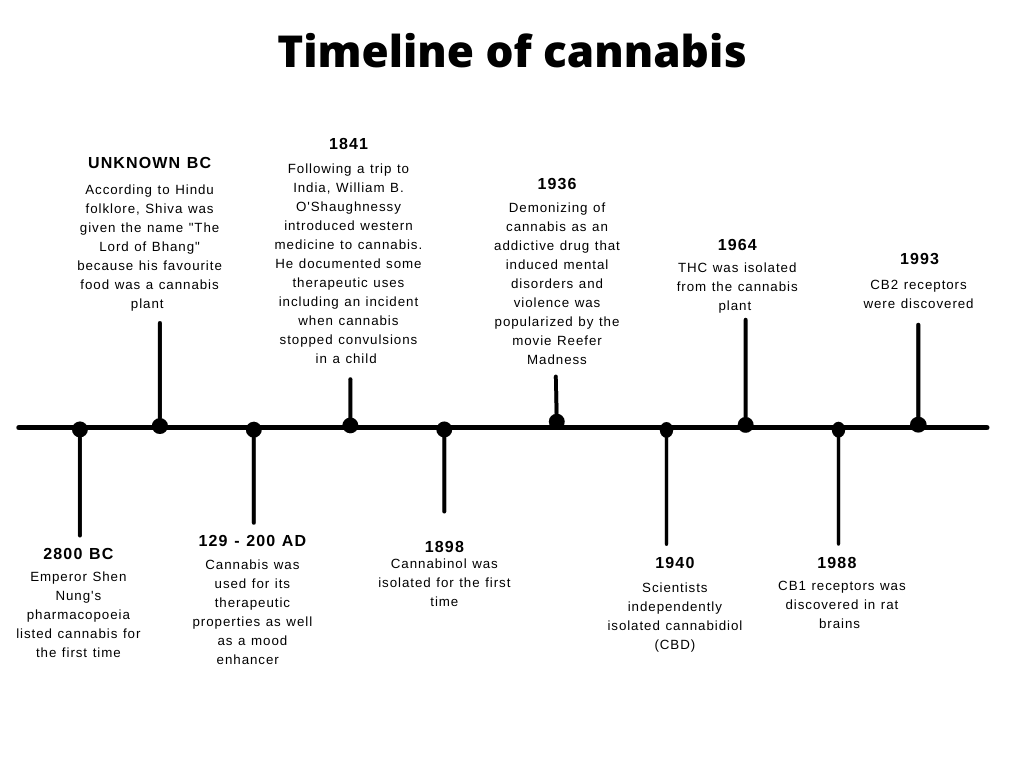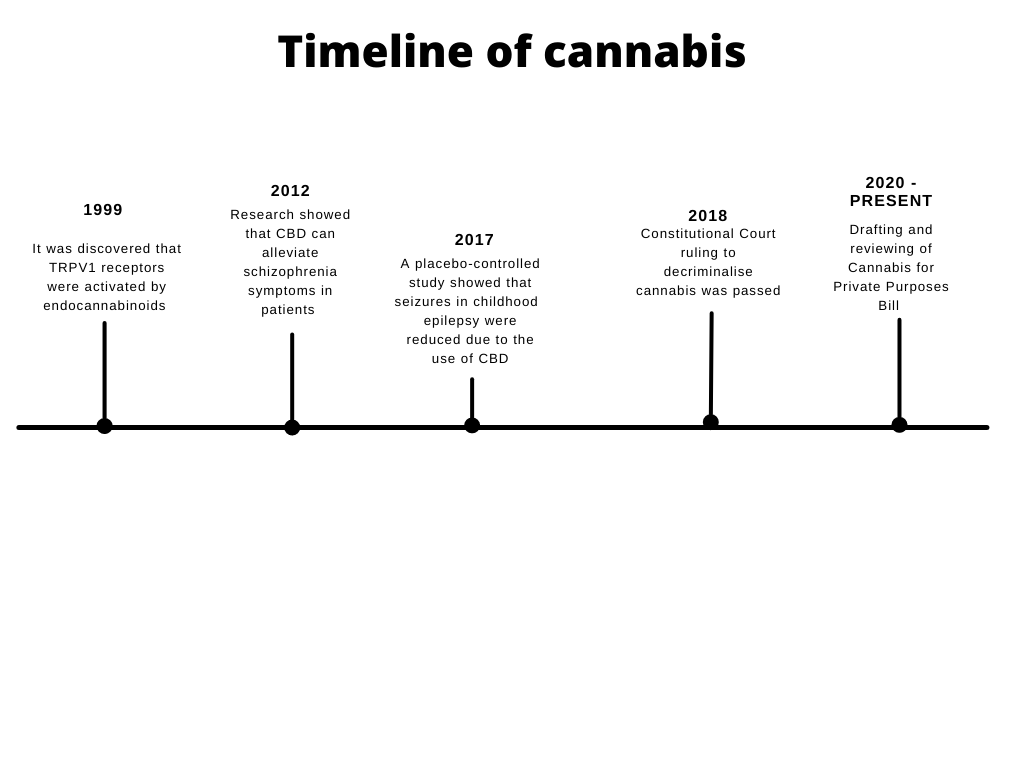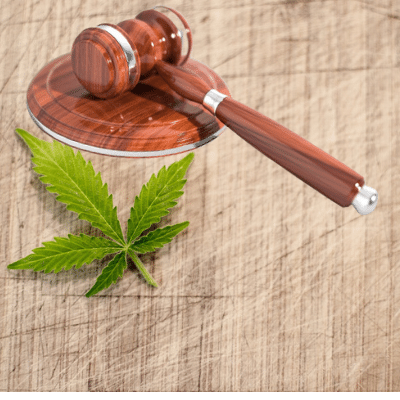The use and early mentions of cannabis date as far back as, Before the Common Era. Historically, cannabis was not used for recreational purposes by most cultures was used for its medicinal properties. Unlike today, ancient cultures saw the psychoactive nature of cannabis as a side effect, not as the primary goal. Despite all the research currently being conducted on cannabis and its medicinal properties, there is a lot we don’t know about the history and origin of cannabis.
History of Cannabis – How it was discovered
Hemp, which is a plant species of cannabis, may be one of the earliest plants to be cultivated. Since the pre-neolithic era, cannabis has been used to make clothing, as a food source, and for its medicinal properties. In ancient times, cannabis was identified as an important crop in ancient Asia. Through archaeological expeditions, hempen fabric, shoes, ropes, and cultural pottery dating as far back as 3000 BC have been discovered in different parts of Asia.
It is not exactly clear how people came to discover the many ways in which cannabis plants and extracts can be used. Historians believe that ancient cultures followed animals to see which plants were edible and which were poisonous. It is believed that animals grazed on cannabis plants when they were sick or injured, resulting in certain ancient cultures becoming heavily dependent on cannabis plants.


How cannabis became popular
The global spread of cannabis started approximately around the 12th century when cannabis was traded in Iraq around 1230 AD. However, smoking cannabis did not become common until tobacco was introduced in the 1500s. This was proven not to be entirely accurate by historians who studied ancient Greek history.
It is believed that cannabis was introduced to Africa by Indian travelers, and was cultivated in southern Africa when Bantu settlers migrated to the south. In 1652, when European settlers landed in Cape Town, cannabis was already in popular and widespread use in South Africa. The indigenous Khoisan and Bantu people used cannabis to make clothes, as a medicinal herb, and also as a recreational “drug”.
Historical of cannabis – Uses
Ancient cultures used cannabis in different ways depending on their environment. In Japan, cannabis was used for its fiber and served as a food source that had an interesting psychoactive effect that people couldn’t explain. As for China during the Neolithic period, pottery and art pieces of the Yangshao people had fiber imprints of cannabis. In later years, the Chinese went on to make their clothes, shoes, and even what is considered today as the earliest form of paper, using hemp.
Due to the work done by archaeologists and historians, it is known that ancient Assyrians used cannabis as an aromatic agent and was used by many other cultures to induce a trance. Ancient Greek historians reported that the people of Scythia traditionally inhaled smoke from burning hemp seed, as a ritual as well as for their own pleasure. Cannabis has even been discovered in the Kingdom of Judah, the discovery lends weight to the belief that cannabis has always been used as a psychoactive agent for ritualistic purposes.
Why was cannabis illegal to begin with?

At some time in history, rulers and leaders have prohibited the use of cannabis. This dates as far back as the middle ages. As colonial powers crossed paths with cannabis-consuming regions and cultures, fear and ignorance surrounding the cannabis plant and the effect it has on the brain, began to spread under the colonial umbrella.
Napoleon is said to have prohibited his soldiers from using cannabis. In 1922, the British colony banned cannabis in South Africa and in 1923 Canada criminalised cannabis before it ever entered the country. There are many other instances where cannabis, a plant used by natives for thousands of years, was banned by colonisers.
It is safe to say that cannabis was considered to be illegal because people feared its psychoactive effects. Throughout the years, as colonialism ended and countries gained democracy, the bans and legalisation of cannabis have pretty much remained unchanged. Only in the last 10 years have countries actively considered amending laws surrounding cannabis use for either medicinal or recreational purposes.
What is the future of cannabis?
In 2021, global cannabis sales stood at $13.4 billion and in the next five years, cannabis sales across the world are expected to increase to as much as $33.6 billion. Due to the infancy of the industry, thousands of cannabis-related businesses have popped up in many countries around the world. Everybody who knows anything about cannabis wants a piece of what is bound to be a multi-trillion-dollar industry.
Cannabis commercialization in Africa
For centuries, farmers have been growing cannabis in Africa. However, due to it being criminalised in many parts of the continent, farmers have been struggling to make a decent living. Fortunately, due to the exponential demand for cannabis around the world, many African countries are now forced to reconsider their cannabis cultivation laws. Africa’s climate is extremely favourable for the cultivation of various cannabis strains.
In 6 years’ time, it is estimated that the European demand for legal cannabis will be approximately $37 billion. The economic potential that lies in Africa for global cannabis cultivation is unimaginable. Currently, African countries, where cannabis is illegal, still grow and export cannabis. Research on cannabis cultivation and the effect it has on the national GDP has shown that millions of Rands in revenue can be generated to better the local economy.
Trends transforming the cannabis industry
Legalisation
The industry is growing each year, with new research being conducted and more information being discovered. For the betterment of national economies, governments around the world want the scientific evidence and legal aspects of a booming cannabis industry to be in alignment. Many countries have legalised or are moving towards legalising cannabis in some shape or form to boost the local economy. Legalising cannabis, particularly in Africa, will create thousands of jobs and increase local tax revenue by millions.
Despite the cannabis industry being one of Africa’s fastest-growing sectors, only 10 countries in Africa have either decriminalised it or are making an effort to do so in the next five years. Research suggests that cannabis production could generate over 1 billion in revenue in less than five years.
Medicinal
Scientific research into the medicinal properties of cannabis is ongoing, and every year there is something new added to the list of discoveries. From psychiatry to oncology, every medical field is looking into how cannabis can treat diseases. Each new discovery changes the trajectory of the cannabis industry and how it will grow and boost national economies.
Recreational
The growing legalisations of cannabis around the world have made it much easier for recreational uses of cannabis. Many countries are reviewing their drug laws to align with new evidence that declassifies cannabis as a “hard drug”. As a result, this has opened up doors for the commercialization of cannabis. With research explicitly showing the difference between THC and CBD, it is becoming widely accepted to use cannabis solely for recreational purposes.
Covid-19 effects on cannabis use
The pandemic has taken a huge toll on people’s mental health across the world. A study conducted by Lancet in October 2021, estimated that there have been over 129 million new cases of major depressive and anxiety disorders since the start of the pandemic. So it is no surprise that global cannabis use is estimated to have increased by 91%. Particularly among people with mental health conditions, since 11 March 2020. With the emergence of new COVID-19 variants that number is expected to rise higher by the end of the year.
Cannabis has a long history. Over thousands of years, many ancient cultures around the world have come across various strains of cannabis. Each culture called it by a different name, used it in different ways, and documented its effects focusing on completely different aspects of the experience.
It is unclear exactly what are the origins of cannabis. However, what is undeniable is the medicinal and calming effect that cannabis has always had. Ancient cultures did not have the evidence to prove it, but they were definitely onto something.
A lot of amazing devices and more are available at Vaperite and Vapeshop. South Africa’s leading vape shop and cannabis paraphernalia outlet chain.
Linked blog articles:






